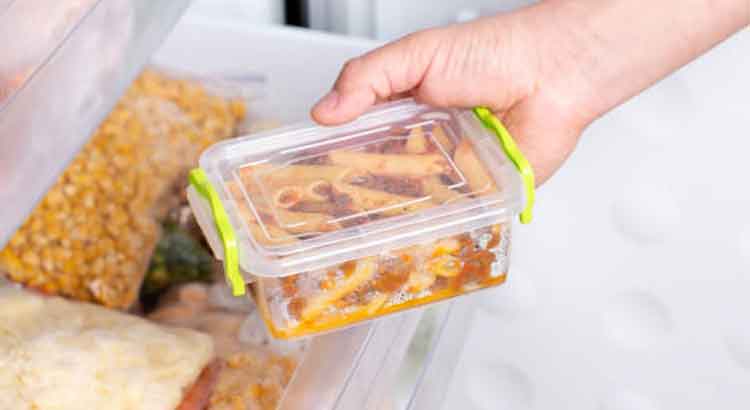Do you ever find yourself with leftover pasta, wondering what to do with it to make it last longer?
Yes, you can freeze pasta. The first thing to do is to let it cool down completely, then portion it out and store it in airtight containers or freezer bags. But there’s a catch!
While freezing pasta can be a lifesaver for busy days, there are some tips and tricks to ensure it tastes just as delicious when you reheat it. In this article, we’ll walk you through the dos and don’ts of freezing pasta, from choosing the right sauces to reheating methods that’ll make your frozen pasta taste like it was just cooked. So, if you want to enjoy a quick and convenient pasta meal anytime, keep reading to discover the secrets of freezing pasta successfully!
Step-by-Step Beginners Guide
Freezing Pasta: A Handy Trick for Leftovers
If you’ve ever found yourself with a surplus of pasta and wondered if you could freeze it, the answer is a resounding yes! Freezing pasta is a smart way to save time and reduce food waste. Here’s a straightforward guide to help you freeze pasta like a pro.
Cook Your Pasta
Start by cooking your pasta until it’s al dente. That means it should be firm but not too soft. Overcooked pasta tends to become mushy when reheated, so keep an eye on the timer. Once it’s ready, drain the pasta and let it cool completely. You can run it under cold water to speed up the cooling process.
Portion it Out
Divide the cooled pasta into serving-sized portions. This step is crucial because it makes it easier to thaw and reheat only what you need later. Small freezer bags or airtight containers work great for this purpose. Make sure to remove any excess air from the bags to prevent freezer burn.
Sauce Matters
Consider the type of sauce you’re using with your pasta. If you plan to freeze pasta with a tomato-based sauce, be aware that the pasta may absorb some of the sauce’s liquid when thawed and reheated. To prevent this, slightly under-sauce your pasta before freezing it. For cream-based sauces, freeze them separately, as they can sometimes separate when frozen and reheated.
Freeze It
Place your portioned pasta in the freezer. Make sure to label the containers or bags with the date to keep track of freshness. Pasta can be stored in the freezer for up to three months, but for the best taste and texture, aim to use it within one to two months.
Reheating Options
When you’re ready to enjoy your frozen pasta, there are a few ways to reheat it.
Microwave Method
For a quick and easy fix, microwave your frozen pasta. Place it in a microwave-safe dish, cover it, and heat it in 30-second intervals, stirring between each interval. This helps distribute the heat evenly and prevents overheating.
Stovetop Method
For a more controlled reheating process, use the stovetop. Place your frozen pasta in a saucepan with a bit of water or sauce to prevent sticking. Heat it over low to medium heat, stirring occasionally until it’s thoroughly heated.
Don’t Forget the Toppings
Toppings can add a burst of flavor to your reheated pasta. Consider adding fresh herbs, grated cheese, or a drizzle of olive oil right before serving. These finishing touches can elevate the dish and make it taste as if it were freshly cooked.
Additional Tips
Label Everything
Labeling is your best friend when it comes to freezing pasta. It might seem like a minor detail, but it can make a big difference. Write the date and a brief description of the pasta dish on each container or bag. This way, you’ll always know what you’re pulling from the freezer, and you can keep track of how long it’s been stored.
Avoid Overcooking
When cooking pasta initially, aim to slightly undercook it. This is especially important if you plan to freeze it. Remember that the pasta will undergo a second cooking process when reheated, so you want to preserve its texture. Test a piece for doneness before draining, and err on the side of caution.
Embrace Variety
Freezing pasta isn’t limited to spaghetti or fettuccine. Get creative! You can freeze a wide range of pasta dishes, from lasagna and baked ziti to macaroni and cheese. Just follow the same principles we’ve discussed. Portion it out, cool it down, and freeze it for future convenience.
Plan Ahead
If you know you’ll be freezing pasta, plan your meals accordingly. Cook a larger batch of pasta when you have the time, and then portion it out for freezing. This way, you’ll always have a stash of homemade frozen meals ready to go when you’re in a rush.
Experiment with Sauces
Don’t hesitate to experiment with different sauces and flavors. While traditional red and white sauces work well, consider pesto, Alfredo, or olive oil-based sauces. Each sauce can bring a unique twist to your frozen pasta dishes, keeping your meals exciting and varied.
Avoid Overcrowding
When freezing pasta, make sure not to overcrowd your freezer. Proper air circulation is essential for efficient freezing, so leave enough space between containers or bags. Overcrowding can slow down the freezing process and result in uneven temperatures.
Thaw Gradually
To preserve the texture and taste of your frozen pasta, allow it to thaw gradually. Transfer it from the freezer to the refrigerator a day before you plan to eat it. Slow thawing prevents moisture loss and helps maintain the pasta’s integrity.
Reheat with Care
When reheating, take your time to avoid overheating and drying out the pasta. Patience is key for the best results. Whether you choose the microwave or stovetop method, keep an eye on the process, and stir occasionally to ensure even heating.
Keep It Fresh
Lastly, remember that freezing pasta is not a one-size-fits-all solution. While it’s great for many pasta dishes, it might not be the best choice for extremely delicate or intricate recipes. Use your judgment and consider the specific needs of each dish to keep your frozen pasta consistently delicious.
Final Thoughts
In the world of cooking and meal preparation, the ability to freeze pasta opens up a realm of possibilities. It’s a time-saving and waste-reducing technique that can make your busy days a bit easier. As we wrap up our exploration of freezing pasta, let’s take a moment to reflect on the key takeaways.
First and foremost, freezing pasta is a fantastic way to extend the life of your favorite pasta dishes. Whether you’re a fan of classic spaghetti, creamy Alfredo, or hearty lasagna, knowing how to freeze these meals can save you from reaching for takeout on those hectic evenings.
However, it’s important to remember that not all pasta dishes are created equal when it comes to freezing. While many hold up admirably in the freezer, some may lose a bit of their original texture or flavor. This is why experimentation is key. Try freezing different pasta dishes to discover which ones suit your taste buds and your schedule best.
In the end, the journey of cooking and food preservation is all about finding what works for you. Freezing pasta can be a valuable tool in your culinary arsenal, but it’s just one of many techniques you can explore. So, whether you’re a pasta enthusiast or simply looking for ways to make meal prep more efficient, embrace the world of freezing pasta, and let it add convenience and flavor to your daily life. Happy cooking!
FAQ
Q: Can I freeze pasta with meat sauce? A: Absolutely! You can freeze pasta with meat sauce, but there are a few things to keep in mind. Make sure the meat sauce is cooked thoroughly before freezing. Consider slightly under-saucing the pasta, as it can absorb some liquid during freezing. Portion it out, and when you’re ready to enjoy it, reheat it following the same principles we discussed earlier.
Q: Can I freeze pasta with vegetables? A: Yes, you can freeze pasta with vegetables. However, be aware that some veggies, like tomatoes and cucumbers, can become mushy when frozen and thawed. To maintain the best texture, blanch the vegetables briefly before adding them to your pasta dishes. This will help preserve their crispness.
Q: How can I prevent freezer burn on my frozen pasta? A: Freezer burn occurs when moisture evaporates from the food and forms ice crystals on the surface. To prevent it, ensure that your pasta is well-sealed in airtight containers or bags, removing as much air as possible. Label your containers with the date to keep track of freshness, and store your pasta in the coldest part of the freezer.
Q: Can I freeze cooked pasta for cold pasta salads? A: While you can freeze cooked pasta for cold pasta salads, it’s essential to note that the texture may change slightly upon thawing. The pasta can become softer than you might prefer for a salad. If you plan to use it this way, consider cooking the pasta a bit less than al dente to compensate for the texture change.
Q: Is it safe to reheat frozen pasta? A: Yes, it’s safe to reheat frozen pasta as long as you follow proper food safety guidelines. Thaw it in the refrigerator, and when reheating, make sure it reaches an internal temperature of 165°F (74°C) to ensure it’s safe to eat. Use the microwave or stovetop method we discussed earlier for even heating.
Q: Can I freeze pasta with dairy-based sauces like macaroni and cheese? A: Yes, you can freeze pasta with dairy-based sauces like macaroni and cheese, but it’s best to freeze them separately. Dairy-based sauces can sometimes separate when frozen and reheated, affecting the texture. Reheat the pasta and sauce separately, then combine them for the best results.
Q: How long can I store frozen pasta? A: Frozen pasta can be stored for up to three months in the freezer. While it may remain safe to eat beyond this timeframe, the quality, flavor, and texture can deteriorate over time. For the best taste and texture, aim to use your frozen pasta within one to two months.
Q: Can I freeze pasta without sauce? A: Yes, you can freeze plain pasta without sauce. Follow the same steps of cooking, cooling, portioning, and storing in airtight containers or bags. This plain pasta can serve as a versatile base for various sauce choices when you’re ready to enjoy it.
Q: Can I freeze stuffed pasta like ravioli or tortellini? A: Yes, you can freeze stuffed pasta like ravioli or tortellini. The process is similar to freezing regular pasta. Just ensure they are cooked to al dente, cooled, and then frozen in a single layer before transferring to a container or bag.
Q: Are there pasta dishes that shouldn’t be frozen? A: While many pasta dishes can be frozen successfully, extremely delicate or intricate recipes may not fare as well. Dishes with ingredients that don’t freeze well, like delicate herbs or crispy toppings, may lose their appeal when thawed. Use your judgment and consider the specific needs of each dish when deciding whether to freeze it.

